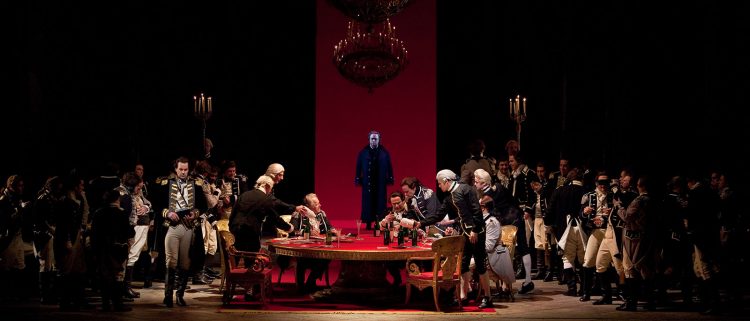by Gregory Moomjy
December 3, 2019
The Metropolitan Opera’s The Queen of Spades
It’s the holiday season, and for New Yorkers that means Tchaikovsky at Lincoln Center. Of course, I am referring to The Nutcracker. But this year opera lovers can treat themselves to Tchaikovsky’s darker side. While the Koch theater literally has dancing sugar plums every year, this December The Met revives The Queen of Spades. Unlike the nutcracker there are no toy soldiers, snowflakes, or sweets that come to life. And while a few young audience members might be unnerved by the Rat King and his army, those regal rodents are nothing compared to the ghostly aristocrats that haunt late 18th century Russia in Tchaikovsky’s opera.
Tchaikovsky is better known for his ballets and symphonies. This is because he came to opera late in life after the world developed an addiction to Wagner. Unfortunately, Tchaikovsky’s operatic output largely consists of intimate stories that lack the grand sweeping gestures, both literary and musical, of Wagner’s operas. If we consider the differences between The Ring which premiered in 1876, and The Queen of Spades from 1890, the differences are striking. The Ring is an epic story about the struggles between Gods and Men. At the end, the world is redeemed from divine corruption by a woman who sacrifices everything for love. By contrast The Queen of Spades follows the misfortunes of a misanthrope who is addicted to gambling as he tries to make his way into Russia’s upper classes. More importantly in terms of the music, The Queen of Spades is a good old fashion number opera. Something that Wagner made obsolete with his through composed Music Dramas.
Yet the current revival at The Met makes the case for The Queen of Spades as a compelling look at greed and the damage it can work on interpersonal relationships. If the opera is not Wagnerian, it is to an extent Verdian. Verdi’s answer to Wagner’s system of leitmotifs was tinta or the idea that the music of each opera should create a distinct sound world that uniquely reflects the story being told. Think of the waltzes and the party music of La Traviata which puts the audience in Paris’s demimonde.
The Queen of Spades is based on the short story by Alexander Pushkin from 1834. On it’s own the plot is too short for a full scale opera and it needed to be padded for the lyrics stage. To answer this problem Tchaikovsky, and his brother Modest, who wrote the libretto, added in a couple of scenes depicting the domestic life of Russian aristocrats. The most important of these extra scenes is a ball which features a short play about Daphnis and Chloe, as well as an entrance by none other than the empress Catherine the Great. This scene, with its lighthearted pristine music in imitation of Mozart creates an excellent contrast to the lush romanticism that Tchaikovsky employs to explore the turbulent emotions of Gherman and Lisa which lurk just below the surface.
The true star of the evening was Lise Davidsen in her Met debut as Lisa. She sang with a purity of tone and depth of voice which was a perfect fit for this naïve girl who makes a ruinous decision to fall in love with the wrong man. In her Act III aria as she waits on the bridge to meet with Gherman, Davidsen joined forces with conductor Vasily Petrenko to create an ideal portrait of a woman whose world is caving in. Petrenko indulged greatly in Tchaikovsky’s romantic tendencies but it was never over the top. As Gherman, Yusif Eyvazov made a compelling case for the aria at the gaming table. The rest of the performance was solid even if occasionally static. In the smaller roles, Elena Maximova as Pauline blended beautifully in her duet with Lisa. Larissa Diadkova sang strongly as the Countess. As Yeletsky, Igor Golovatenko gave a plush rendition of his show stopping aria in Act II. Alexy Markov as Tomsky makes one grateful that Russia and its satellites have not lost their distinct national style of singing. And as usual the chorus under the direction of Donald Palumbo was in fine voice. This was especially true of the male choristers who caroused in the final scene.
The production directed by Elijah Moshinsky was staged like a play at an 18th century theater. Equal parts spooky and intimate, at times it seemed as if the whole opera were occurring in Ghermann’s mind. All in all, I left the theater with a new appreciation for Tchaikovsky. New Yorkers should take advantage of the rare opportunity they have this season. See The Nutcracker, then go across the plaza and see The Queen of Spades. Trust me, you’ll never think of Tchaikovsky the same way.
